Jordan B. Cooper's Blog, page 46
December 23, 2014
Make Way for the King of Hearts
 My pastor’s sermon from this past Sunday. The title above is what I have assigned to it. The bold is mine.
My pastor’s sermon from this past Sunday. The title above is what I have assigned to it. The bold is mine.
“And the Lord God will give to him the throne of his father David” Luke 1:32
Dear brothers and sisters in Christ,
Crown Prince William and his wife Kate were in New York City last week. William will become King of England, once his grandmother, Queen Elizabeth dies or abdicates, and his father, Prince Charles dies or abdicates. That is probably not going to happen any time soon.
Still, the media was all over the visit of the Royals. Here was a future King, visiting the United States. There is a show, on television called Game of Thrones. It is based on a series of fantasy novels entitled “A Song of ice and Fire,” and is all about fictional Kingdoms and thrones, and intrigues and the like. I have never seen it. It is not recommended viewing. And yet, millions of people are fascinated, apparently, by it.
I do not know who coined the phrase, but when John F. Kennedy became President, somehow, the fictional kingdom of Camelot became equated with his administration Apparently it was his wife Jackie, in an interview with Life magazine, after his assassination, that equated the two.
So obviously, even though we live in a democracy, a democratic republic it is said nowadays, we continue to have a fascination with Kingdoms, even with Kings.
Why? I don’t know. The thought of being born into power? The challenge of holding onto that power through intrigue? Is is living in castles that is so appealing? Whatever. It is probably safe to say, that whatever the reason, for a modern fascination with Kingdoms and Kings, such a fascination comes to a screeching halt, is abandoned, is set aside, when the fact is mentioned that Jesus Christ is a King. He is the King of Kings.
That Jesus Christ sits on the throne of His father David. That all who believe in Jesus Christ as their Lord and Savior from sin and death are citizens, or, even better, subjects, of the Kingdom of Christ.
So our text for this morning: the announcement of the angel Gabriel to Mary, that Jesus the Son of God, to be born to her, would “sit on the throne of His father David”, and would reign, not just for a few decades, but would rule forever.
How did we become citizens / subjects of this Kingdom?
Luther put it nicely in the meaning to the Second Article of the Apostle’s Creed in the Small Catechism: “I believe that Jesus Christ, true God, begotten of the Father from eternity, and also true man, born of the Virgin Mary, is my Lord (is my King, my Sovereign, my Liege), who has redeemed me, a lost and condemned person, purchased and won me from all sins, from death, and from the power of the devil; not with gold or silver, but with His holy, precious blood and with His innocent suffering and death, that I might be his own…
(listen up here!) and live under Him in His Kingdom and serve Him in everlasting righteousness, innocence and blessedness”.
So in short, through His death on the cross, Christ Jesus our Lord, redeemed us from sin, death and the devil so that we could be citizens / subjects of His Kingdom, and serve Him in everlasting righteousness, innocence, and blessedness. That does sound wonderful, doesn’t it?
To be a subject in the Kingdom of Jesus. To have Jesus as our King. Again: to be a subject in the Kingdom of Jesus. To have Jesus as our King.
I mean, the arrival of William and Kate in New York, gives one the thought of living in such a Kingdom, of living in England, perhaps. But then comes to mind, the reason the United States exists today, and that is a rebellion against a King. A revolution against being citizens, being subjects, of a Kingdom.
And yes, even though comparisons were made in the aftermath of the horrific assassination of our 35th president between the Kennedy administration and the ideal Kingdom of Camelot, time has allowed for the acceptance of more sober assessments of that period of Presidential history.
And television shows like Game of Thrones? Well, it can be exciting to imagine being a King, or Queen, ruling over a Kingdom of some sort, but let’s be honest: most of the characters of such shows, as in the actual kingdoms of history, end up being killed in battle, poisoned, imprisoned, banished, assassinated, or even worse. Rarely did the Kings of old, or so it seems, die of old age.
In short, earthly kingdoms, Kingdoms of Men, fictional or not, are lacking and lacking greatly.
That being so, why don’t we simply embrace the truly wondrous Kingdom, the truly glorious Kingdom, the truly eternal Kingdom of which we already are subjects? Why do we not simply rejoice that the baby, to be born of Mary, as proclaimed by the angel Gabriel, has rescued us from sin, death and the devil and through our baptisms into Him, through the work of the Holy Spirit on His behalf, already made us citizens, subjects, of a kingdom in which there are no intrigues, but only Righteousness, Innocence, and Blessedness?
But perhaps that is the problem. Like the disciples of Jesus, before the bestowal of the Holy Spirit on Pentecost, the appeal of an earthly Kingdom, in which we are King or Queen is that we are reigning. We are ruling, we are having our will fulfilled daily, for good or ill. Like the cowardly lion in the Wizard of Oz, it is easy to think, or even to sing (to ourselves) “If I were the King of the Forest” and then complete that thought with our brilliant idea of making everyone around us, do exactly what we want them to do.
But even real kings have discovered that being and earthly King is not all of what it is cracked up to be. And anyone who has been given and wielded real authority and power on this earth knows that the responsibility that comes with such authority can simply be overwhelming.
So we repent, don’t we? Repent of our desires to rule over those around us; our desires to somehow impose our will on others for our own good, of grasping after, power for power’s sake, and rejoice, that the Kingdom of which we are a part, The Kingdom of Jesus Christ, the Kingdom of God, the Kingdom of Heaven, is a Kingdom or righteousness, and innocence and blessedness:
The Righteousness, Innocence and Blessedness of our King, bestowed upon us, through faith in Him. In this Kingdom, it is really not a matter of lording it over others, but serving others. Not of arrogance but of humility, not of sinfulness but of sinlessness.
What does the Kingdom look like? Does it have a castle? Does it have walls? Does it have an impressive coat of arms? Where do we find this Kingdom? Well of course, the Kingdom of our King Jesus is a Kingdom of hearts, a Kingdom in which he reigns by the power of the Holy Spirit within us.
But that being so, it is not as if the Kingdom of our King Jesus cannot be found. Where called ministers of Christ are found, prayer, praise and thanksgiving are heard. Where there is the Holy Word of God, confession and absolution, the Lord’s Supper and Holy Baptism; where prayer is offered and the Holy Cross is lived-out daily, there you know you have found that Kingdom of hearts, the Kingdom of our King Jesus here on earth.
Sure, on the Last Day, everything will change, everything will be visible. We will see our King! And all of us, who are citizens, subjects, in His Kingdom will identify each other as such; on the Last Day, we will see our Heavenly Kingdom and the places where we will live.
At that time, everything will be visible and known. Until that time everything is hidden and therefore only somewhat perceptible. And so what can be said about the Kingdom of our King Jesus? I mean, that is a great part of Kingdoms in this world. What can be said about them, and what in fact is said about them.
People in the world still citizens of such kingdoms usually are proud that they are. What can be said then about being a citizen / a subject in the Kingdom of our King Jesus? What can we say about it? What can we tell our friends and neighbors?
I posted the following comments from Luther, on the church Facebook page this last week, newly translated remarks on Revelation 3:21… Remarks that give us an idea of what we can think about our citizenship in the Kingdom of our King Jesus:
We should marvel at the gospel to such an extent that it should make us proud and glad. It should make us boast: I am a Christian. I am baptized. Therefore I do not at all doubt that, by the Lord Jesus, I will be and remain a lord over sin and death; that heaven and all creation are to serve me for good. Even if I had the crown of the Turkish emperor, it is nothing compared to the fact that I have a share in Christ’s inheritance and that I am to live with him in eternity. Yet where do you find those who truly believe this and take it to heart? To be sure, we know the right words and can repeat them, but we are quickly convicted of the fact that we do not believe it. For we do not marvel, otherwise we would be not only glad, but then also boastful. For a Christian is a boastful, blessed person who cares about neither the devil nor any misfortune. For he knows that, by Christ, he is a lord over all this.”
You see, at the end of the day, this is the wonder of being a citizen, a subject, within the Kingdom of King Jesus. Through our King, who now reigns over heaven and earth, we too have been granted authority over sin, death, and the devil.
No, we don’t live in a castle surrounded by a wall and moat, keeping away from us all that would harm us, in this world. But we do live in a Spiritual Kingdom, and that is, the Spiritual Kingdom of our King Jesus, in which our King Lives and Reigns, and as His citizens, we will always receive what we need.
This is better than any Earthly Kingdom which exists now or ever has. This is better even than any fictional kingdom like Camelot or fantasy kingdom like that of the Game of Thrones. And what is best about it, is that even now, we are living within it, and will continue to do so for all eternity.
Amen.
Now may the peace of God which passes all human understanding keep our hearts and minds in Christ Jesus, unto life everlasting, Amen.
Image credit: http://www.clker.com/clipart-king-of-...
December 17, 2014
Very Short and Very Sweet Martin Luther Devotions

Check out the items available from Lutheran Press here. Facebook link here.
What does Martin Luther have to say about the inner-life of the Christian? Newly translated comments on Bible texts for every day of the year are now being made available free of charge by Lutheran Press. Simply “like” Lutheran Press on Facebook to receive Luther’s intriguing insights daily.
Lutheran Press, started by pastors Paul Strawn (full disclosure: he is my pastor) and Holger Sonntag, is the publishing house that translated into English Martin Luther’s Antinomian Disputations. Some of the excerpts from the daily devotions are also not available elsewhere in English.
Here are some of my favorite samples from the past couple weeks:
From Dec. 16:
“Since the time we have stopped offering burnt offerings and drink offerings to the queen of heaven, we have lacked everything.”– Jeremiah 44:18
When God’s Word arose, a famine arose with it. For example, at the time of Abraham (Gen. 12:10), Isaac (Gen. 26:1), Jacob, Joseph (Gen. 42:5; 43:1), Elijah (1 Kings 18:2), and Elisha (2 Kings 4:38) there were severe famines while the light of truth shone brightly. And when the gospel took its beginning, there was a great famine throughout the whole world, Acts 11:28. This obviously must be the fault of the dear gospel and Word of God, and not the world’s previous misdeeds and current hardened ingratitude. Accordingly, the Jews blamed all their misfortunes on Jeremiah’s teaching, Jer. 44:15-19. And the Romans, when they had been destroyed by the Goths, could not help but blame their defeat on the fact that they had become Christians. But let them do what they always do. The world is the world. Just as those became liars and perished, so these too shall become liars and perish so that nonetheless Christ and his Word remain. There he sits at the right hand of God. Let him who so desires and is evil tear him down from his throne. But while Christ remains there, we also will remain. That’s a fact. (Vol. 5, Jena edition, p. 179)
From Dec. 15:
“If they called the father of the household Beelzebub, how much more will they call the members of the household this name!”– Matthew 10:25
When the world calls you a heretic, deceiver, liar, and rebel, this is a good sign that you are a decent man and similar to your Lord Christ. For he had to be just those things and be condemned and crucified with the murderers. What would it matter to me as a preacher, if the world called me a devil, when I know that God calls me his angel? Let the world call me a deceiver for as long as it desires. Meanwhile, God calls me his faithful attendant and his household servant. The angels call me their coworker. The saints call me their brother. The believers call me their father. The wretched souls call me their savior. The ignorant call me their light. And God says: “Yes, it shall be so,” and so do the angels with all creatures. How handsomely the world, along with the devil, deceived me with its reviling and abuse. What great victory it won over me. What great damage it inflicted on me, the dear world. (Vol. 5, Jena edition, p. 176a)
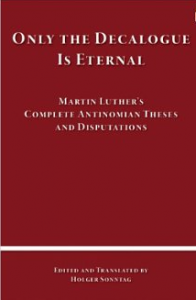
Martin Luther’s Antinomian Disputations, translated by Pastor Holger Sonntag. More.
From Dec. 5:
“Your will be done on earth as in heaven.” (Matthew 6:10)
If a good will were in us, we would not need this prayer. Therefore, let us examine ourselves, so we do not do what we want to do and instead do what we do not want to do and thus always act against our will. For we all have to confess that our will is never good, no matter how pretty it may appear, unless it is coerced and driven to the point that it gives up. And in this way let us strive to gain a superior will that overcomes our own will and not to be uncertain. For, when we find that there is only one will in us, and not two wills set against one another, let us in this way get accustomed to follow the superior will against our own will. … After all, even Christ’s will had to cease, even though it was without a doubt good – it was, in fact, the very best will of all that have ever been – so that the divine will would be done [cf. Lk. 22:42]. Why, then, do we poor worms take pride in our will although it is never without evil and always worthy to be thwarted? (Luther, vol. I, Jena edition, on the Lord’s Prayer)
Regarding this last one, as Paul Strawn says, it is important because of the topic it involves: the very real fight between the Old Adam and the New Man, what it signifies, and how it, at times, resolves. The point here is that if we find one will within, it should be that which we fight against. In other words, the tension between the Old Adam and New Man is normal, but the will of the New Man should win out. The rest of the context makes it clear the superior will is not Christ’s will, but the will of the Christian who is united to Christ (AE vol, 42).
I hope you will take time to dive into Luther’s Bible Treasures, complements of Lutheran Press!
December 16, 2014
Blessed Martin Luther: “The person who can rightly divide Law and Gospel has reason to thank God.”
From Martin Luther’s Commentary on the Epistle to the Galatians (1535), trans. Theodore Graebner (Grand Rapids, Michigan: Zondervan Publishing House, 1949) p. 60
 [Ch. 2] VERSE 14. But when I saw that they walked not uprightly according to the truth of the gospel.
[Ch. 2] VERSE 14. But when I saw that they walked not uprightly according to the truth of the gospel.No one except Paul had his eyes open. Consequently it was his duty to reprove Peter and his followers for swerving from the truth of the Gospel. It was no easy task for Paul to reprimand Peter. To the honor of Peter it must be said that he took the correction. No doubt, he freely acknowledged his fault.
The person who can rightly divide Law and Gospel has reason to thank God. He is a true theologian. I must confess that in times of temptation I do not always know how to do it. To divide Law and Gospel means to place the Gospel in heaven, and to keep the Law on earth; to call the righteousness of the Gospel heavenly, and the righteousness of the Law earthly; to put as much difference between the righteousness of the Gospel and that of the Law, as there is difference between day and night. If it is a question of faith or conscience, ignore the Law entirely. If it is a question of works, then lift high the lantern of works and the righteousness of the Law. If your conscience is oppressed with a sense of sin, talk to your conscience. Say: “You are now groveling in the dirt. You are now a laboring ass. Go ahead, and carry your burden. But why don’t you mount up to heaven? There the Law cannot follow you!” Leave the ass burdened with laws behind in the valley. But your conscience, let it ascend with Isaac into the mountain.
In civil life obedience to the law is severely required. In civil life Gospel, conscience, grace, remission of sins, Christ Himself, do not count, but only Moses with the lawbooks. If we bear in mind this distinction, neither Gospel nor Law shall trespass upon each other. The moment Law and sin cross into heaven, i.e., your conscience, kick them out. On the other hand, when grace wanders unto the earth, i.e., into the body, tell grace: “You have no business to be around the dreg and dung of this bodily life. You belong in heaven.”
By his compromising attitude Peter confused the separation of Law and Gospel. Paul had to do something about it. He reproved Peter, not to embarrass him, but to conserve the difference between the Gospel which justifies in heaven, and the Law which justifies on earth.
The right separation between Law and Gospel is very important to know. Christian doctrine is impossible without it. Let all who love and fear God, diligently learn the difference, not only in theory but also in practice.
When your conscience gets into trouble, say to yourself: “There is a time to die, and a time to live; a time to learn the Law, and a time to unlearn the Law; a time to hear the Gospel, and a time to ignore the Gospel. Let the Law now depart, and let the Gospel enter, for now is the right time to hear the Gospel, and not the Law.” However, when the conflict of conscience is over and external duties must be performed, close your ears to the Gospel, and open them wide to the Law.
+SDG+
Are you kinda poor? Do you still want to read Walther’s gem of a book that expounds on the topic which Luther treats here? Then this one’s for you:
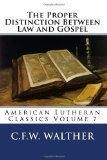
See larger image
The Proper Distinction Between Law and Gospel (American Lutheran Classics) (Volume 7) (Paperback)
By (author): C.F.W. Walther
List Price:
$13.00 USD
New From:
$10.33 USD In Stock
Used from:
Out of Stock

Do you like what you read here?
Would you like to help me out financially while I’m at seminary?
Please click here to take a look at my donations page. Thank you!
Walking in the Spirit: Romans 8 in light of 6 and 7
I ran across this question in a Facebook group:
What did St. Paul mean in Romans 8 when he spoke of walking according to the spirit? I read through that chapter tonight, and I had several flash backs from my days of Calvinism. It was sermons, such as the one preached in the video I will link (only four minutes – taken from a 40 minute sermon originally preached by a Reformed preacher), that drove me to despair and made me believe I was reprobate. Romans 8 was part of the problem, where walking according to the spirit meant going on witch hunts for sin in your life. Can someone please straighten me out in regard to what St. Paul means in this chapter?
My answer got a little long for Facebook:
It’s crucial to remember Romans 7 as you read Romans 8, and to remember Romans 8 as you read Romans 7. If you let 7 eat 8, you lose the doctrine of Sanctification, and if you let 8 eat 7, you lose the doctrine of Justification. Ask the guy in Romans 7 if he’s mortifying the deeds of the body (8:13), and he’ll say “I see another law in my members, warring against the law of my mind, and bringing me into captivity to the law of sin which is in my members. O wretched man that I am! Who shall deliver me from the body of this death?” (7:23-24) And then he’ll say, by way of an answer, “I thank God through Jesus Christ our Lord” (7:25), because “There is therefore now no condemnation to them which are in Christ Jesus, who walk not after the flesh, but after the Spirit” (8:1).
What is the “therefore” referring to? It’s not the last statement in the preceding verse, “So then with the mind I myself serve the law of God; but with the flesh the law of sin” (7:25), because that’s just a summary of the problem that Paul’s been exploring since 7:7—the impotence, even the seeming betrayal, of the Law. That’s a parenthesis in his main argument. Romans 8:1 actually picks up where 7:6 left off. There is no question in chapter 8 about whether we are in the Spirit or the flesh. Follow the argument back to the beginning of chapter 6. We are not in the flesh, because we have been baptized into Christ’s death (6:3). That means our flesh is dead, which means we’ve gone beyond the reach of the Law (6:7, 7:1-6). Therefore there is “now no condemnation to them which are [baptized into] Christ.”
So who are those “who walk not after the flesh but after the Spirit”? They are the baptized. Including the guy in Rom. 7 who’s constantly losing the struggle with his undead flesh? Yes. Otherwise, why would he say, “Thanks be to God through Jesus Christ our Lord” and then in the next verse invoke the end of condemnation? Chapter 8 can be a little scary when read in isolation because it doesn’t distinguish between having the Spirit and walking in the Spirit, but chapter 6 already did that when Paul told us that we are dead to sin, and then spent nine verses (11-19) exhorting us to act the way he just said we objectively are. Now, it is still true that “to be carnally minded is death” (8:6), but remember, that’s the one thing the guy in Rom. 7 has going for him in terms of a godly life. “So then with the mind I myself serve the law of God; but with the flesh the law of sin” (7:25). As long as you hate your sin and fight it in the strength of Christ’s forgiveness, you are walking in the Spirit. Not very well yet, not as you will do in the resurrection when the work of the Spirit who is in you now (8:10) has been completed (8:11), and your flesh has been buried with a stake through its heart, but you are. (Incidentally, this certain outcome in the resurrection, and its whole-to-the-parts connection to all temporal sanctification, could very well explain chapter 8’s equation of having the Spirit and walking in the Spirit).
So when the question arises, “Are you in the flesh or in the Spirit? Are you dead or alive?” you don’t answer it by looking to your works. You answer it by looking to the promise God gave you in Baptism. “I’m in Christ, so I’m in the Spirit.” In a passing sense you are two men: simul iustus et peccator, but you don’t have to say, “I’m in both.” The peccator is dead; he just doesn’t know it yet. The future You, the eternal You, the real You, is a citizen of the World That Is To Come: a member of Christ, animated by His Spirit now and forever. Understood in its context, Rom. 8 is actually a very comforting chapter.
December 15, 2014
John and Isaiah, Mary and Elizabeth
This is the sermon from last Sunday, the 2nd of Advent (I’m a little behind) and the shorter sermon from our second midweek service. The first one considers the prophecy from Isaiah 40, “A voice cries: ‘In the wilderness prepare the way of the LORD; make straight in the desert a highway for our God. Every valley shall be lifted up, and every mountain and hill be made low'” (v. 3-4a, the whole text being v. 1-11) in light of St. Mark’s introduction of John the Baptist (1:1-8). The second one discusses the first half of the Magnificat (Luke 1:46-50) in light of Ruth 4:9-17.
Second Sunday of Advent:
Evening Prayer for the Second Week of Advent
(with a broad view of our sanctuary, and a distant preacher, since the fancy camera had technical issues):
December 14, 2014
ConcordCast: a daily audio broadcast of the Lutheran Confessions
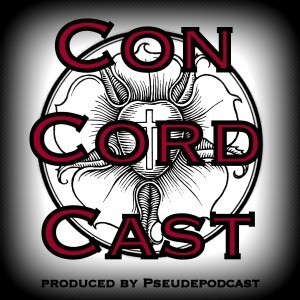 Are you interested in learning more about what Lutherans believe, teach, and confess?
Are you interested in learning more about what Lutherans believe, teach, and confess?
Do you find that you don’t have much time to read throughout the day?
Do you have an irrational fear of papercuts?
If you answered “yes” to any of these questions, then you may be interested in my new project. It’s called ConcordCast, and it’s a daily audio broadcast of the Lutheran Confessions. Together with a team of able-voiced contributors, I’m reading the Book of Concord out loud following a schedule of daily readings. No whistles, no bells, just the Book of Concord. Ah, minimalism…
ConcordCast airs every day in a short drive-time style podcast, and then again on Saturday afternoons with a recap of the week’s readings. The first week of Advent seemed to be an appropriately Christian time to start, so today (Sunday is the start of week three (here’s the schedule we’re following). If all goes according to plan, this project will run for a full year.
Our goal in all of this is simply to help you stay tuned to the sound pattern of words which is our unique inheritance as Lutherans: the Christian Book of Concord.
Listening options:
» ConcordCast.com
» iTunes
»Feedburner
…you can also keep tabs on this project via Twitter, Facebook, and Google Plus.
Interested in doing a reading? Please contact me via the form below:
[contact-form-7]
+SDG+
December 13, 2014
Behold, and it came to pass, a new Lutheran T-shirt…
Back in 2007 or so, New Reformation Press started marketing this shirt:
You’ve probably seen it before. It’s sort of emblematic of what some would call “the Lutheran view of sanctification,” and what others would call, “a dumb caricature, which, while intending to be funny, says more about the lack of understanding of sanctification on the part of the person wearing it than anything else.” De gustibus. Don’t shoot the messenger.
Anyway, I’ve got a great idea for my own version of a Lutheran sanctification T-shirt. I don’t generally wear T-shirts, myself, except as undergarments (no, I’m not sophisticated, I just like collars on my shirts), but I know that some people like them. Again, de gustibus. Anyway, here’s my idea:
Cool, huh?
This shirt has a couple things going for it. First off, it’s hilarious!
LOL! OMG! It’s so funny, because…because…
Lol? No?
…
OK, so it’s not hilarious. It is, however, a quote from the Lutheran Confessions. In this it is markedly superior to the shirt sold by New Reformation Press, which promotes a message that is not only materially at odds with the Lutheran Confessions, but which seems to make light of the call of Christ to the Christian to take up the cross and follow Him, daily crucify the flesh, daily put on the new man, etc.
Anyway, who wants one?
Actually, here’s my real T-shirt idea:
But here again the adversaries will cry out that there is no need of good works if they do not merit eternal life… Of course, it is necessary to do good works. We say that, eternal life has been promised to the justified. But those who walk according to the flesh retain neither faith nor righteousness. We are for this very end justified, that, being righteous, we may begin to do good works and to obey God’s Law.

Karel Dujardin, “St Paul Healing the Cripple at Lystra”; 1663
Oil on canvas.
We are regenerated and receive the Holy Ghost for the very end that the new life may produce new works, new dispositions, the fear and love of God, hatred of concupiscence, etc. This faith of which we speak arises in repentance, and ought to be, established and grow in the midst of good works, temptations, and dangers, so that we may continually be the more firmly persuaded that God for Christ’s sake cares for us, forgives us, hears us. This is not learned without many and great struggles.
How often is conscience aroused, how often does it incite even to despair when it brings to view sins, either old or new, or the impurity of our nature! This handwriting is not blotted out without a great struggle, in which experience testifies what a difficult matter faith is. And while we are cheered in the midst of the terrors and receive consolation, other spiritual movements at the same time grow: the knowledge of God, fear of God, hope, love of God; and we are regenerated, as Paul says (Colossians 3:10 and 2 Corinthians 3:18), in the knowledge of God, and, beholding the glory of the Lord, are changed into the same image, i.e., we receive the true knowledge of God, so that we truly fear Him, truly trust that we are cared for, and that we are heard by Him.
This regeneration is, as it were, the beginning of eternal life, as Paul says, Romans 8:10: “If Christ be in you, the body is dead because of sin; but the Spirit is life because of righteousness.” And 2 Corinthians 5:2-3: “We are clothed upon, if so be that, being clothed, we shall not be found naked.” From these statements the candid reader can judge that we certainly require good works, since we teach that this faith arises in repentance, and in repentance ought continually to increase; and in these matters we place Christian and spiritual perfection, if repentance and faith grow together in repentance. This can be better understood by the godly than those things which are taught by the adversaries concerning contemplation or perfection.
Just as, however, justification pertains to faith, so also life eternal pertains to faith. And Peter says, 1 Peter 1:9: “Receiving the end, or fruit, of your faith, the salvation of your souls.” For the adversaries confess that the justified are children of God and coheirs of Christ. Afterwards works, because on account of faith they please God, merit other bodily and spiritual rewards. For there will be distinctions in the glory of the saints. (Apology of the Augsburg Confession, Article III: Of Love and the Fulfilling of the Law, 227-234)
+SDG+
December 9, 2014
“When [sin] reigns in one’s nature, not yet fully purged, then assuredly the true doctrine is soon lost”

Is a proper kind of synergism necessary to keep doctrine pure?
Martin Luther was not one to mince words.
In one his last sermons, on Rom. 12:3, Luther stated about a month before his death (AE 51:376-377):
“Therefore, see to it that you hold reason in check and do not follow her beautiful cogitations. Throw dirt in her face and make her ugly. Don’t you remember the mystery of the holy Trinity and the blood of Jesus Christ with which you have been washed of your sins? Again, concerning the sacrament, the fanatical antisacramentalists say, ‘What’s the use of bread and wine? How can God the Almighty give his body in bread?’ I wish they had to eat their own dirt. They are so smart that nobody can fool them. If you had one in a mortar and crushed him with seven pestles his foolishness still would not depart from him. Reason is and should be drowned in baptism, and this foolish wisdom will not harm you, if you hear the beloved Son of God saying, ‘Take, eat; this is my body, which is given for you; this bread which is administered to you, I say, is my body.’ If I hear and accept this, then I trample reason and its wisdom under foot and say, ‘You cursed whore, shut up! Are you trying to seduce me into committing fornication with the devil?’ That’s the way reason is purged and made free through the Word of the Son of God.
So let us deal with the fanatics as the prophets dealt with the spiritual harlots, the idolaters, the wiseacres, who want to do things better than God does. We should say to them, ‘I have a Bridegroom, I will listen to him. Your wisdom is utter foolishness. I destroy your wisdom and trample it under foot.’ This struggle will go on till the last day. This is what Paul [in Rom. 12:3] wants; we are to quench not only the low desires but also the high desires, reason and its high wisdom. When whoredom invades you, strike it dead, but do this far more when spiritual whoredom tempts you. Nothing pleases a man so much as self-love, when he has a passion for his own wisdom. The cupidity of a greedy man is as nothing compared with a man’s hearty pleasure in his own ideas. He then brings these fine ideas into the Scriptures, and this is devilishness pure and simple. This sin is forgiven, but when it reigns in one’s nature, not yet fully purged, then assuredly the true doctrine is soon lost, however willingly one preaches and willingly one listens. Then Christ is gone. Then they fall down before the devil on the mountain and worship him (Matt. 4 [:8–10]).”
Also note this quote:
AE 24:246: “It does not require such great skill to begin to love; but, as Christ says here, remaining in love takes real skill and virtue. In matrimony many people are initially filled with such ardent affection and passion that they would fairly eat each other; later they become bitter foes. The same thing happens among Christian brethren. A trivial cause may dispel love and separate those who should really be bound with the firmest ties; it turns them into the worst and bitterest enemies. That is what happened in Christendom after the days of the apostles, when the devil raised up his schismatic spirits and heretics, so that bishops and pastors became inflamed with hatred against one another and then also divided the people into many kinds of sects and schisms from which Christendom suffered terrible harm. That is the devil’s joy and delight. He strives for nothing else than to destroy love among Christians and to create utter hatred and envy. For he knows very well that Christendom is built and preserved by love. In Col. 3:14 Paul speaks of love as ‘binding everything together in perfect harmony.’ And in 1 Cor. 13:13 he calls love the greatest virtue, which accomplishes and achieves most in the Christian realm. For in the absence of love doctrine cannot remain pure; nor can hearts be held together in unity.”
-Quotes obtained from the materials given out at the 27th Annual Lutheran Free Conference: “The Character of Christian Worship: It May Not Be What You Think” – Saturday, October 25th, 2014 at Redeemer Lutheran Church in St. Cloud, MN. Full audio available here.
December 8, 2014
“Why do you talk so much about sanctification?”
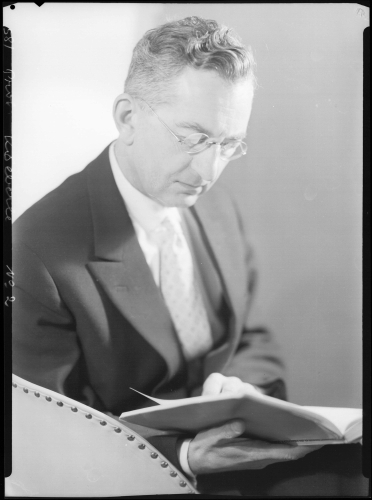
Adolf Köberle, Professor of Systematic Theology in Basel; b. 1898, d. 1990
To get at an answer to this question (often put to me more in the form of a charge or accusation), I’d like to direct the reader to an extended excerpt from Adolf Köberle’s very useful work, The Quest for Holiness. If you have never read, or if it’s been awhile since you’ve read, Köberle’s book, then read this chapter sometime today, as it stands alone as a rather marvelous essay. It’s something of a pause in the context of the larger work, in which the author takes time to clarify and reframe “what is at stake.” This I think Köberle does admirably well.
I do not always agree with Köberle, mainly because he has no place in his theological understanding for the Formula of Concord; thus he does not treat of sanctification in both the broad and narrow senses of the term (cf. Sanctification in Conrad Lindberg’s “Christian Dogmatics”). He also doesn’t acknowledge the Lutheran distinction between mortal and venial sin, which, while different than Rome’s view, is still real. That having been said, Köberle is not so easily appropriated by those who wish to stress the monergistic dimension of sanctification to the neglect or even exclusion of its synergistic aspect (cf. Surburg’s blog » Mark’s thoughts: Lutheran synergism and the regenerate will; Gottesdienst Online » On Synergism [the good kind]). Indeed, I have to wonder if many recent proponents of Köberle’s work have even read it.
With that said, I will simply step aside and let the following chapter from The Quest for Holiness, entitled “The Significance of Sanctification in the Preservation or Loss of the State of Faith”, speak for itself. I have bolded several portions of the text which are especially germane to answering the question, “Why do you talk so much about sanctification?” I have also split up some his paragraphs for the sake of ease of reading—my eyes tend to glaze when reading unbroken chunks of text on a computer screen.
One final editorial note, because it’s been a bee in my bonnet for awhile, now…
If something is true, we ought to gladly confess it. Full stop. The emphasis on sanctification taken up by many contemporary Lutherans, clerical and lay, should not be cavalierly dismissed and stigmatized as “wanting to have as much skin in the game as possible”, “wanting to push aside the Holy Spirit and make room for yourself”, “trying to be fruit checkers“, “looking inside ourselves for Christ/assurance”, et al. Perhaps what motivates such Lutherans is rather an earnest desire to discern what is true and gladly confess it. As Christians we have an obligation to believe, teach, and confess the faith in its fullness, not lay a pragmatistic axe to the limbs and branches of our doctrine, taking only that which we find “comforting.” In the final estimation, the truth, the whole truth, and nothing but the truth is comforting, even if in the short term we do not find it to be as comforting as we’d like. Truth norms comfort, not the other way around. “I quite agree that the Christian religion is, in the long run, a thing of unspeakable comfort,” writes C. S. Lewis in Mere Christianity. “But it does not begin in comfort…
…it begins in the dismay I have been describing, and it is no use at all trying to go on to that comfort without first going through that dismay. In religion, as in war and everything else, comfort is the one thing you cannot get by looking for it. If you look for truth, you may find comfort in the end: if you look for comfort you will not get either comfort or truth—only soft soap and wishful thinking to begin with and, in the end, despair. Most of us have got over the prewar wishful thinking about international politics. It is time we did the same about religion.” (C. S. Lewis, Mere Christianity; MacMillan: 1952; 39)
 (Now, if the Lewis-haters feel the need to pop out of the woodwork and inform me that Clive wasn’t a Lutheran, “didn’t get the Gospel”, was a free-will junkie, liked reason too much, etc., I would ask that you kindly save such tiresome prating for your diary, leaving it out of the comments to this post. Or you could subtweet about it. Twitter really is a sort of publicly accessible diary, methinks. Secondly—I know that “Truth is a man, bro.” If you think that this means that we can’t also speak of truth in dogmatic and practical terms, then there’s no point in you and I trying to have a conversation. Enjoy dropping the mic and walking away—yes, we are all mind-blown.)
(Now, if the Lewis-haters feel the need to pop out of the woodwork and inform me that Clive wasn’t a Lutheran, “didn’t get the Gospel”, was a free-will junkie, liked reason too much, etc., I would ask that you kindly save such tiresome prating for your diary, leaving it out of the comments to this post. Or you could subtweet about it. Twitter really is a sort of publicly accessible diary, methinks. Secondly—I know that “Truth is a man, bro.” If you think that this means that we can’t also speak of truth in dogmatic and practical terms, then there’s no point in you and I trying to have a conversation. Enjoy dropping the mic and walking away—yes, we are all mind-blown.)
Moving on…
Lastly, a word of caution: Köberle is really going to twist the dagger in the following selection, and I don’t think anyone can not squirm while reading it, nor can anyone beat his chest and say, “I thank thee, Lord, that I am not like…” This net catches all the fish. So p roceed with caution. This is deep stuff. But, to my earlier point, there is certainly comfort to be found when all is said and done.
Are you weak and heavy laden? Flee to Christ in the means of grace. #Advent #Confession HT @esgetology pic.twitter.com/bEeo2A36sH
— Trent Demarest (@p5eudepigrapha) December 6, 2014
From…
Chapter VI.
The Significance of Sanctification in the Preservation or Loss
of the State of Faith
In the course of our previous investigations we have seen that no attempts to gain sanctification by ourselves, whether of moral, mystical or speculative sort, are able to establish a communion with God, because all our human powers have been crippled through the enslaving and condemning power of sin (Chapters I and II). What no efforts at deification were able to attain God freely gave the world in Jesus Christ (Chapter III). In Him He promises and assures us of the two facts: “Thy sins are forgiven thee,” and “Arise and walk!” This renewal applies to the whole man and reaches to all spheres of life; to body, soul and spirit; to understanding, emotion, will and deed (Chapter IV). So no creative part, nor cooperation, which might carry some merit with it, can be attributed to the one who yields to the offer of salvation as it is proclaimed in reconciliation and redemption.
On the other hand man possesses the fearful ability to cast away the salvation that has been offered, and perhaps even attested to him personally, and so to destroy himself. Faith because of thankfulness and obedience, because of fear and love drives man to ceaseless exercise in prayer, self-discipline and service, but the natural man does not cease to despise, to hinder and destroy the “drawing to the Father by the Son” (Chapter V). This conflict in which faith and unbelief strive for the mastery continues till the hour of death. But this conflict has not been sufficiently described if it is simply considered as a general conflict that is bound to come between flesh and spirit because of their divergent principles. It has an animated history that is as full of incident, as difficult and as trying as any warfare between two nations. Here there are great battles and small skirmishes, the gain or loss of territories, displays of courageousness and of weakness, and finally the certainty that its termination must be one of two things, either a final decisive victory or a final and utter defeat. As a general must be vitally concerned in gaining information concerning the position, resources and tactics of the enemy, and as the utilization of all that might bring failure or success in a battle calls for his most strenuous exertions, so it is of vital importance for the miles christianus to know the concealed moral laws governing sin and grace that can either imperil his state of faith, or strengthen and preserve him in the conflict he must face. It is this concrete “history of the warfare of the heart” that we would discuss in the following pages.
Whosoever wants to describe the doctrine of justification must first possess a doctrine of sin. This we tried to furnish in the second chapter. Whoever wishes to provide a doctrine of sanctification must also furnish a doctrine of sins. But is not one sin like another sin, of equal seriousness and with similar consequences, or should we and must we classify them? The Reformation theology in opposition to the Roman Catholic distinction of mortal and venial sins, and the frivolous use often made of that distinction in the practice of the Confessional, always emphasized the fact that sin is an “absolute category” in which there can be no differentiation. Before God every sin, the most trifling as well as the most serious, is a complete rupture of the proper relation of trust and obedience that we owe to God, which in every case makes the offender unconditionally guilty. The theology of the 51st Psalm excludes all “puppet sins.” Before the Holy One the insidious entrance of a presumptuous thought is as grievous as the act of adultery. The degree of guilt is always infinite and requires infinite mercy for its erasure and remission.
 But so far we have only seen one side. Every sin involves something more than its accusing or condemning status before the holiness of God. It likewise exerts a fettering and mastering power over man and it is this aspect we have to consider as we inquire whether every sin has an equal power in enslaving our moral intentions, in dulling and confusing our ability to understand and perceive. It is evident that the answer to this question is to the greatest importance for the preservation or the loss of our state of faith.
But so far we have only seen one side. Every sin involves something more than its accusing or condemning status before the holiness of God. It likewise exerts a fettering and mastering power over man and it is this aspect we have to consider as we inquire whether every sin has an equal power in enslaving our moral intentions, in dulling and confusing our ability to understand and perceive. It is evident that the answer to this question is to the greatest importance for the preservation or the loss of our state of faith.
A survey of the history of theology shows that this very essential problem has received very little consideration. We find the most attention given it in the casuistic literature of Roman Catholic moral theology and in the confessional manuals, the third volume of Albrecht Ritschl’s great work on Justification and Reconciliation, the writings of Johannes Müller and the latest literature of Anthroposophism and the Christengemeinschaft. True, all of these tendencies have shoved the doctrine of sin to a place behind their teaching concerning sins. They think of it more lightly and less seriously than the Second Article of the Augsburg Confession and consequently have always severely criticized this article of the Confession. Here we once more receive the painful impression that theological perception is apparently unable to apprehend or express more than one statement in its entirety. The other side, which in this case is the more important one, is not stated clearly and emphatically, just as the church dogmatics has neglected this phase of the question.

Published by Just & Sinner; click here to go to book page.
However there have always been some evangelical theologians who saw the fact very clearly and who maintained that every sin established the same infinite gulf between God and man but who did not, on that account, fail to furnish a detailed history and psychology of sin, a satanology and a demonology. The old Lutheran dogmatics, besides their fundamental definitions of sin, provided a classification of “actual sins.” During the past century Culmann, Martensen, Julius Müller, Harless and Vilmar particularly felt this problem and applied themselves to its solution. The last named deserves especial commendation because with all his painstaking discussion of particular sins he always distinguished them from original sin and subordinated them to it, while the first two named, as a result of their theosophical affinity to Jacob Böhme and Franz von Baader, often neglected this essential difference in relative importance. Recently men like Schlatter, Althaus, Elert, Piper and Heim have again called attention to the twofold character of this question.
Nevertheless evangelical theology still lacks a hamartiology which adequately describes the fearful possibilities of sin both in its accusing and its enslaving character, and which is not afraid to learn from the unquestionably able Roman Catholic moral theologians, from Ritschl, R. Rothe and Steiner, without losing Luther’s fundamental view of the enslaving burden of guilt that pervades all sin. For our own presentation, as well as for pastoral care and for training in the service of our neighbor, it is necessary to realize both; how sin invariably destroys communion with God and how it works to accomplish this end. To the dogmatician this second question may appear entirely secondary, but as soon as we begin to reflect more deeply on the moral problem of sanctification we can no longer pass it by as unimportant psychologizing. We have to pause and consider because of what is involved. The one who dodges this question will not get very far.
In his vigorous polemic, Die Theologie der Tatschen wider die Theologie der Rhetorik, Vilmar called for a “teaching concerning temptation.” It is indeed a prerequisite for successful warfare against any foe that we know the way in which he gives battle. The diabolical, uncanny way in which sin operates shows itself through a double manifestation. The one is its apparent insignificance and apparent harmlessness on first sight. It is never suggested that the spark may become a fire, the snowball an avalanche, idle thoughts turn into terrible passions and a voluntary yielding (once does not mean anything!) result in a terrible bondage. Only with the passing of time do the fetters become evident which had been fastened by the commission of the first. The first slip seems voluntary and easily retraced.
But the enemy has a still more dangerous weapon at hand. When enlisting men in his service he not only disregards all reference to future obligations but with the very first handclasp bestows intoxicating pleasure, apparently boundless liberty, and promises still more for the future. The Bible tirelessly paints pictures of the enemy and his manifold deceits, with great clearness and unmistakable warnings; on occasion compares the cozenage of sin to the harlot “who sitteth at the door of her house, on a seat in the high places of the city, to call passengers who go right on their ways.” Whoever follows her “knoweth not that the dead are there” (Prov. 9:14-18). Out of the appreciation of the tricky wiles of the beginnings of sin, from an understanding of the deceptive inversion of all values in the first temptation (eritis secut Deus), faith will acquire a holy fear and vigilance and will understand how the deceiver is the most tricky, and therefore the most dangerous, at the time of his first approach. Once men are pledged to him he soon drops the mask. The one to whom the Spirit has given a “renewed mind” sees the end of the road from the very beginning; sees the ripe poisonous fruit in its seed—and smiles at the efforts of the tempter.
A second bit of understanding that is quite essential for the conflict of sanctification is an insight into the difference in the enslaving power of different sins. The old Protestant division of sins, which is quite in accord with Scripture, into those working internally and those acting externally; into sins of the heart, the tongue and the deed (peccata intern et externa; peccata cordis, oris et operis) is anything but irrelevant trifling. It is true that Jesus in the words of the sermon on the mount used the very expression that dogmatics employed to designate distinctions in act, in the opposite way, expressly to remove every distinction. The angry thought in God’s sight is on an equality with the act of murder, the lustful glance is as evil as the adultery. But because we know ourselves equally guilty in God’s sight in the commission of every sin it does not follow that the effect of evil thoughts, words and deeds is equally significant for myself and my neighbor in every case, and that therefore there is no difference occasioned by the instrument used in its commission, whether it be the heart, the tongue or the hand.
In the first place we cannot take the influence exerted by either a morbid or a wholesome mental life seriously enough. The worst delusion of the materialistic thinking of the past decade is its almost complete loss of reverence or fear of the mighty, invisible power of “mere” ideas. Even a morbid imagination that remains limited to fancies and desires is a terrifying, living power, that can torment and enslave its victims to a fearful degree, creates an atmosphere around itself and infects and poisons others, as it tremendously increases the power of evil in the world, while in a blessed way, all pure, wholesome thinking and feeling, even when it happens in the most obscure places, spreads irresistibly and bears its certain fruit. The unbridled fecundity of morbid and evil imaginations must therefore be mercilessly combated and avoided because, under any circumstances, it is sufficient by itself alone to corrupt man utterly.
But the most uncanny thing about such a play of desires is something else. It is the fact that the unrestrained roving thoughts never remain confined to the hidden chambers of the soul, but they crowd out into the open and display themselves in words and actions, that enslave, burden and shape the future of their author still more certainly than the morbid thoughts. We might say that as in the transition from the friendly disposition to the helpful deed there is always a demon present who would prevent its realization, so in the progress from the wrathful unclean desire to the hurtful work and destructive act, there is a guardian angel on the watch, seeking to hinder us from crossing the threshold. The very hesitation that restrains an evil thought from becoming an external act is proof that here again there is a fresh realization that it would involve a renewed, conscious, deeper descent into evil than that of the previous slavery, and one that would consequently still further weaken the soul.
An evil word is like a sped arrow that cannot be recalled. Its results are immeasurable and beyond all human control. The word has stronger formative power, it multiplies itself more rapidly and quickly than the originating thought. It produces lasting history, enmity and contention; inconspicuously and without effort it mould the opinions and views of many, thus involving all the more responsibility, and so there is special justification for another distinction of the old dogmatics; the one it made between peccata propria, sins that involve only the individual, and peccata alien, sins that involve others, either by awakening in them the slumbering passions or by inciting and strengthening those already active. Because a malicious statement not only weakens the one who utters it in his own powers of moral resistance but involves at least two others, the one spoken to and the one spoken about, it becomes of great importance as to whether the evil intention realizes its purposes or whether it is repressed by the fear of God and the might of the Spirit.
“The word is worse than the thought, the deed worse than the word” (Vilmar, op. cit., p. 224). For it is the deed that finally involves the whole man, binds him closer and closer with the fetters of sin and “makes return harder, the growth of sin easier.” Deeds leave a deeper impression on the character than thoughts. Deeds produce terrible situations that cannot be recalled nor changed and whose bonds the entangled wretch tries in vain to sever by still more serious wrongdoing. It was not the covetous thought, the lustful glance nor the storm in his soul but the actual deed that drove David into such humiliating shamelessness that he caused the rightful husband of the stolen wife to become drunken, so that he could not enter his own house and that finally led to his murder.
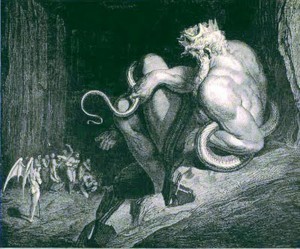 Scripture is especially severe in dealing with sins of the flesh, not only because of the terrible consequences for the companion in sin but above all because they invariably destroy the spiritual gifts of the believer. Adultery and whoredom are therefore always associated with the sins that exclude men from salvation. The other items of the catalogue of vices include a striking number of sins of action. Perjury injures life much more seriously, and ruins it more terribly within and without than the mere dalliance with the thought of its possibility, even though such an evil thought is just as bad in God’s sight as the false oath itself. The power of murder to darken and becloud the soul is far greater than the hateful thought. An accomplished swindle enslaves and torments a man’s life in an entirely different way from the “mere” desire for gold. Erotic stimulation is destroyed and vanishes again where the spirit of discipline prevails, but man loses forever his moral integrity and honor by one act of transgression. The recourse to magic, the “charming” or children produces a deeper depravity and a greater immersion in satanic power than the tempting suggestions of ungodly superstitious thoughts.
Scripture is especially severe in dealing with sins of the flesh, not only because of the terrible consequences for the companion in sin but above all because they invariably destroy the spiritual gifts of the believer. Adultery and whoredom are therefore always associated with the sins that exclude men from salvation. The other items of the catalogue of vices include a striking number of sins of action. Perjury injures life much more seriously, and ruins it more terribly within and without than the mere dalliance with the thought of its possibility, even though such an evil thought is just as bad in God’s sight as the false oath itself. The power of murder to darken and becloud the soul is far greater than the hateful thought. An accomplished swindle enslaves and torments a man’s life in an entirely different way from the “mere” desire for gold. Erotic stimulation is destroyed and vanishes again where the spirit of discipline prevails, but man loses forever his moral integrity and honor by one act of transgression. The recourse to magic, the “charming” or children produces a deeper depravity and a greater immersion in satanic power than the tempting suggestions of ungodly superstitious thoughts.
(Buy book here; read on in Ch. 6 below)
+SDG+

See larger image
The Quest for Holiness: A Biblical, Historical and Systematic Investigation (Paperback)
By (author): Adolf Koberle
List Price:
$30.00 USD
New From:
$26.21 USD In Stock
Used from:
$31.35 USD In Stock

December 6, 2014
A Brief History of the Lutheran Church in America by J.L. Neve
Price: $16 Kindle: $9
In contemporary American Christianity, the history of the church is often neglected. While the churches of the Lutheran Reformation have not neglected their own historical roots in the sixteenth century, they have sometimes forgotten the unique history of the American Lutheran Church.
In this monumental work, J.L. Neve gives an expansive history of the Lutheran Church in America through the beginning of the twentieth century. He introduces each of the major, and minor, American Synods, and outlines various differences in theology and polity. He also gives brief biographical information on all the significant figures in each American Synod.
While Neve’s own theological positions are made apparent in the book, he is fair and sympathetic to those with whom he disagrees. This book is an essential read for anyone interested in the history of the Lutheran Church in the United States.
About the author:
Juergen Ludwig Neve (1865-1943) served as Professor of Church History at the German Theological Seminary of the General Synod in Chicago, Illinois, from 1887 to 1892; as Professor of Church History and Symbolics at Western Theological Seminary in Atchison, Kansas from 1898 to 1909; and as Professor of Symbolics and the History of Doctrine at Hamma Divinity School in Springfield, Ohio from 1909 to 1943.







